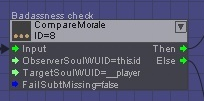here are Silvias answers to your community questions:
I guess some of you might want to lynch me for that, but I’m not a beer drinker at all. I’m more into a good old whiskey and mead. In Austria apiculture is still relatively wide-spread and you can buy high quality mead, honey and other products from local producers.
I’m glad that you liked googling Galsterweib! And yes, I’m trying to include some old words, when I see fit.
There are several craftsmen in the game, but the technical jargon will be relatively limited. They will only give Henry detailed descriptions of their trade when it makes sense. But you will find some uncommon artisanry like “Striegler”.
Priests and monks were educated people, so they will use high register of course. Some words and prayers will even be in Latin.
You’re right, there are Germans in the game and in Germany they are speaking German of course. But the tensions between them and the Czechs are still there and represented by the usage of eloquent and charming names like “Kackdeutscher”.
Yes, idioms are always a tricky thing because they are hardly ever the same in the target language. In this dialogue we are lucky that the pun is already foreshadowed with the word “blue-blooded”, so it didn’t get lost in translation. Generally it always depends on the situation. If an idiom conveys important information like in the snippet above and the German equivalent does not, I will translate the dialogue very freely and rewrite it, so that the meaning is kept.
I do work in Excel, but I’ve played the game and I know the plot and characters. Translating line by line without knowing the context is not uncommon, but for me it’s an absolute no-go! Keeping the meaning, flair and style can only be achieved if you’re translating creatively and freely and sometimes this means to rewrite certain lines and dialogues.
I speak a little Russian and Japanese and the former has helped me once or twice, when certain character roles were in Czech for example or when I did some research on etymology. I found it very interesting that кикимора (Kikimora) is somehow related to the German Mahr or Alp.
Like I stated before, I did play the Beta and Kingdom Come: Deliverance is definitely a game I like. You are right though, I do know every story twist and dialogue, but I still want to see what it all looks like once the game is finished.
I cannot say how many hours it takes to translate all the dialogues, because I joined the team relatively early (a few months before the Beta was released) and I’ve worked on the game since then. The texts have been iterated and changed a few times and so has the translation. Having sad that, I also do a lot of other things beside translating, like research, updating the glossary, checking the consistence, reporting errors and story glitches, bothering the designers with questions…
I used to work alone, but since my three colleagues have joined me, I’m hardly ever translating myself. I’m basically the person who keeps it all together and ensures that the speech styles are consistent throughout the whole game, that the names and terms are correct and so on.
No, there are no plans that I will be voice acting. And to be honest, that’s better for the game, the players and humanity as a whole! My voice doesn’t sound so bad, but without training it would be pretty monotonous.
A lot of people have asked me that and the answer is no. The game will be translated into standard, modern German and there is a good reason for it. Language evolves and changes over time and the German language is devided into three basic categories (I’m using German terms here):
- Althochdeutsch (~750-1050)
- Mittelhochdeutsch (~1050-1350)
- Neuhochdeutsch (~1350-now)
There are more categories of course, that further divide the language, like for example Frühneuhochdeutsch (~1350-1650), but you have to understand that these persiods are not set in stone and that there are regional differences. Some regions have adopted changes earlier, some later and you also have to keep in mind that there were severe differences between written and spoken language.
It would be an enormous if not impossible task to create a historically correct representation of the language that was spoken at that time. And even if we decided to use a written text like the Nibelungenlied as a template - which would not be a historically accurate representation of the language the people spoke - the players would have problems understanding the characters. Here’s a sample of the Nibelungenlied (Mittelhochdeutsch above, Neuhochdeutsch below):
Uns ist in alten mæren wunders vil geseit
von helden lobebæren, von grôʒer arebeit,
von fröuden, hôchgezîten, von weinen und von klagen,
von küener recken strîten muget ír nu wunder hœren sagen.
Eʒ wuohs in Burgonden ein vil edel magedîn,
daʒ in allen landen niht schœners mohte sîn,
Kriemhilt geheiʒen: si wart ein scœne wîp.
dar umbe muosen degene vil verliesen den lîp.
Uns wurde in alten Erzählungen viel Wundersames gesagt
von ruhmreichen Helden, von großem Leid,
von Freuden, Festen, von Weinen und von Klagen,
vom Kampf kühner Recken sollt ihr nun Wunder hören sagen.
Es wuchs in Burgund ein sehr feines Mädchen heran,
dass in allen Ländern kein schöneres sein konnte,
Kriemhild geheißen: Sie wurde eine schöne Frau.
Deswegen mussten viele Kämpfer ihr Leben verlieren. (Wikipedia)
As you can see, it’s pretty hard to understand the text and it would be impossible for us to translate the game into Mittelhochdeutsch. But if you want to read texts in Mittelhochdeutsch, there are plenty of books out there and if want to take a look at the handwritten original of the Nibelungenlied, please follow the link below, although you probably won’t be able to read it :
http://daten.digitale-sammlungen.de/~db/0003/bsb00035316/images/index.html?fip=193.174.98.30&seite=5&pdfseitex=





 You can find a
You can find a 













































































 )
)




